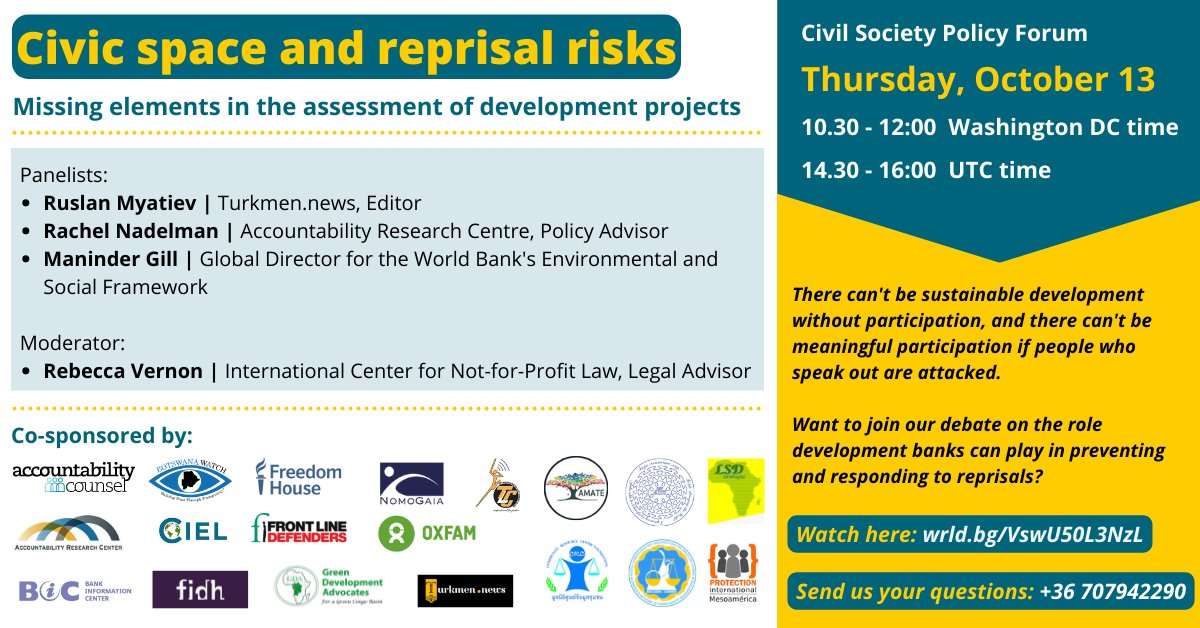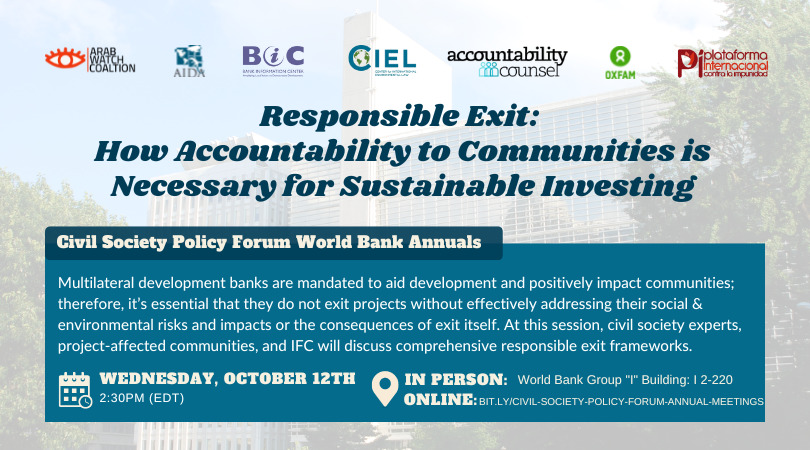This week, CIEL’s experts will be engaging at the meetings to discuss major issues and challenges facing communities who have been directly affected by development projects.
This week, the World Bank Group (WBG) and the International Monetary Fund (IMF) are holding their Annual Meetings in Washington, DC. The meetings bring together finance ministers, government delegates, parliamentarians, and actors from the private sector, academia, and civil society to discuss the global economy, poverty eradication, economic development, and aid. This year they will have to consider the global economic crisis, the ongoing impacts of the pandemic on the world, food insecurity, and the climate crisis, to name a few.
A fundamental component of the Annual Meetings is the Civil Society Policy Forum (CSPF), which creates an important opportunity for civil society organizations (CSOs) and communities affected by development projects to engage in key conversations and share their critical insights and expertise with World Bank staff and officials.
The establishment of the CSPF within the context of the Annual Meetings was an important milestone in opening space for direct dialogue between civil society and the WBG and IMF on a variety of topics, ranging from environmental and social policies to project design and operation. In addition, the CSPF shines a spotlight on the importance of involving affected communities in decision-making within the World Bank, given that these policies, practices, and projects have direct bearing on people’s lives and livelihoods all around the world.
CSOs have long been at the forefront of ensuring that this space remains integral to the World Bank’s events for the week and that it increasingly draws World Bank staff into conversations about the most pressing issues and challenges development finance institutions (DFIs) currently face. This work has taken on new importance since the onset of the COVID-19 pandemic, which exacerbated existing challenges related to travel and effective engagement by human rights defenders and CSOs, highlighted barriers to meaningful public participation in virtual fora, and heightened the risk of reprisals that human rights defenders often face for speaking out against projects financed by multilateral development banks (MDBs).
This year, the Annual Meetings will be held in person for the first time since the pandemic began. CIEL will be participating in the CSPF sessions to discuss some of the major issues and challenges facing our community partners who have been directly affected by development projects. Throughout the coming week and beyond, we will seek to improve awareness and understanding of how the decisions made in Washington affect communities worldwide.
Important Topics to Follow
During the CSPF, CIEL will engage in urgent conversations on accountability, responsible exit, and reprisals.
Accountability
The creation of independent accountability mechanisms (IAMs) at DFIs — starting with the World Bank Inspection Panel in 1993 — marked an important milestone for civil society and communities working to hold DFIs accountable. However, the struggle for accountability, effective remedy, and the continued existence of functional and truly independent accountability mechanisms is ongoing at all DFIs.
CIEL is collaborating with partners on a session during the CSPF that will explore how a new accountability system within the IMF could help ensure that the institution is equipped to address the negative impacts of its programs on the communities and individuals who are increasingly at risk due to complex crises and the expansion of the IMF’s work.
Join us for this conversation on Thursday, October 13 at 4:30 p.m. EDT at World Bank Group HQ2-09B-073 (livestream will be made available here).
Responsible Exit
MDBs like the World Bank are mandated to aid development and positively impact communities. At the very least, they are committed to ensuring that their investments do not harm people and the environment. However, there has been a growing number of cases where MDBs have withdrawn from problematic development projects, without addressing the harms that these projects cause to the environment and project-affected communities.
For this reason, CIEL and partners are holding an event focused on the importance of ensuring that banks exit projects in a responsible manner. This conversation will underscore why MDBs must effectively address such projects’ social and environmental risks and impacts, as well as the consequences of exit itself.
Join us for this conversation on Wednesday, October 12 at 2:30 p.m. EDT at World Bank Group “I” Building 2-220 (livestream will be made available here).
Reprisals
Communities cannot meaningfully participate in development processes if those speaking out face the risk of reprisals. CIEL and partners are hosting a conversation about this critical topic during the CSPF. At this event, panelists will reflect on the importance of evaluating civic space restrictions and addressing retaliation risks at both the country- and project-level, while presenting recommendations for how the World Bank can better enable meaningful and safe participation by project-affected communities.
Join us for this conversation on Thursday, October 13 at 10:30 a.m. EDT at World Bank Group “I” Building 2-220 “I” Building Second Floor Room 220 (livestream will be made available here).

To keep up with these important conversations during the CSPF, follow CIEL on Twitter.

